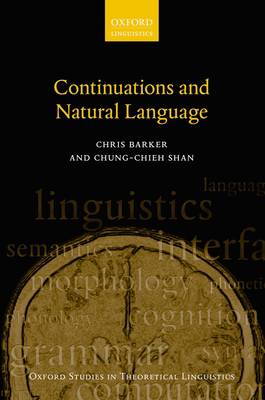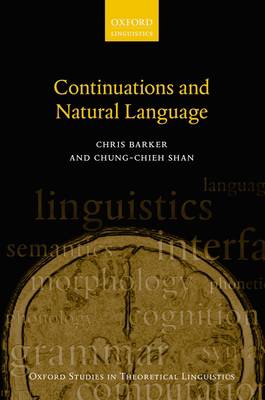
- Retrait gratuit dans votre magasin Club
- 7.000.000 titres dans notre catalogue
- Payer en toute sécurité
- Toujours un magasin près de chez vous
- Retrait gratuit dans votre magasin Club
- 7.000.0000 titres dans notre catalogue
- Payer en toute sécurité
- Toujours un magasin près de chez vous
Description
This book takes concepts developed by researchers in theoretical computer science and adapts and applies them to the study of natural language meaning. Summarizing more than a decade of research, Chris Barker and Chung-chieh Shan put forward the Continuation Hypothesis: that the meaning of a natural language expression can depend on its own continuation. In Part I, the authors develop a continuation-based theory of scope and quantificational binding and provide an explanation for order sensitivity in scope-related phenomena such as scope ambiguity, crossover, superiority, reconstruction, negative polarity licensing, dynamic anaphora, and donkey anaphora. Part II outlines an innovative substructural logic for reasoning about continuations and proposes an analysis of the compositional semantics of adjectives such as 'same' in terms of parasitic and recursive scope. It also shows that certain cases of ellipsis should be treated as anaphora to a continuation, leading to a new explanation for a subtype of sluicing known as sprouting. The book makes a significant contribution to work on scope, reference, quantification, and other central aspects of semantics and will appeal to semanticists in linguistics and philosophy at graduate level and above.
Spécifications
Parties prenantes
- Auteur(s) :
- Editeur:
Contenu
- Nombre de pages :
- 256
- Langue:
- Anglais
- Collection :
Caractéristiques
- EAN:
- 9780199575022
- Date de parution :
- 27-01-15
- Format:
- Livre broché
- Format numérique:
- Trade paperback (VS)
- Dimensions :
- 155 mm x 229 mm
- Poids :
- 376 g

Les avis
Nous publions uniquement les avis qui respectent les conditions requises. Consultez nos conditions pour les avis.






